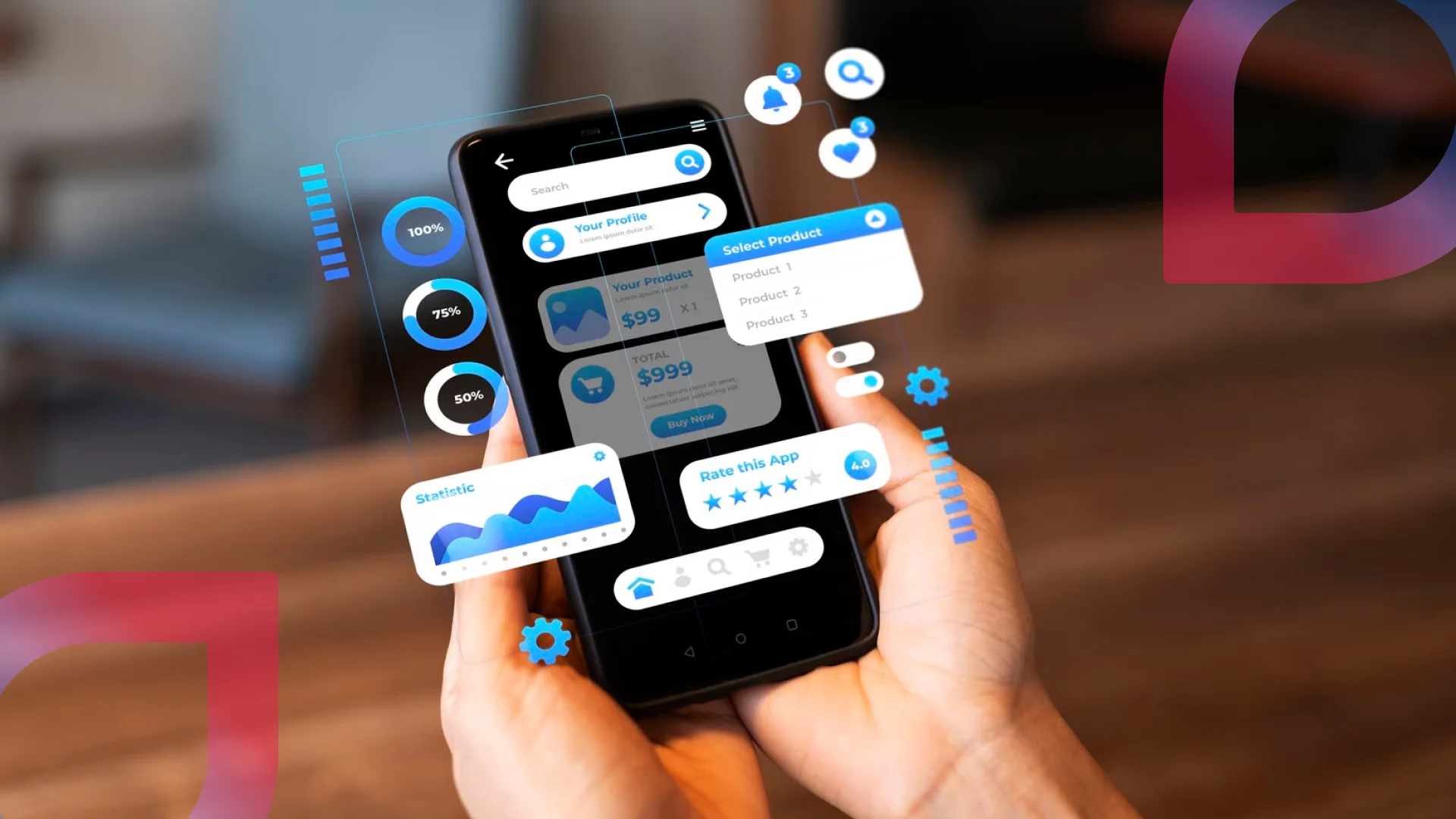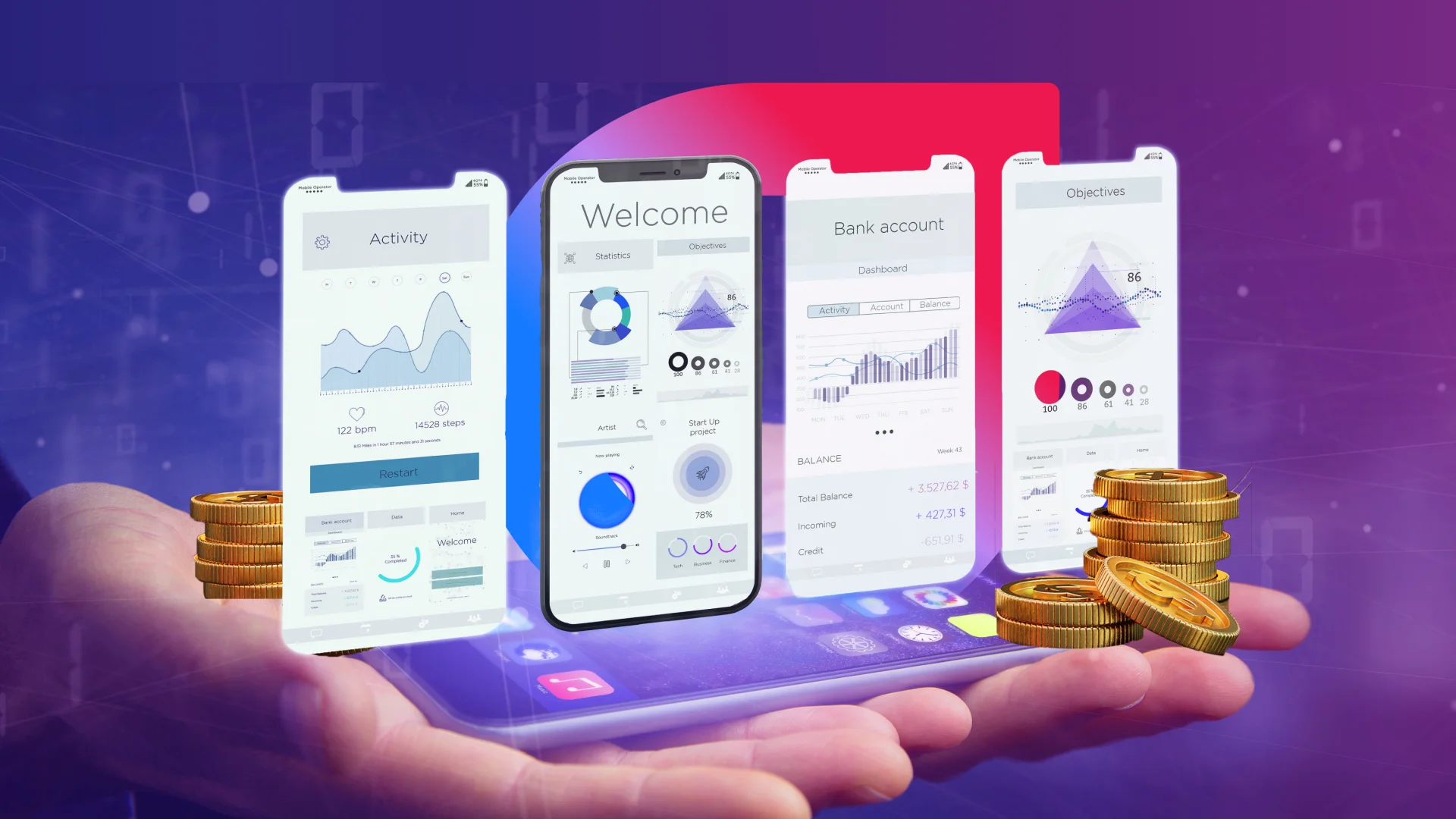Benefits of Developing a Mobile App for Your Business
- Mobile
- August 5, 2024
Mobile app development has become the preferred choice for businesses, as 88% of the time people spend on mobile devices is within apps, not mobile websites. Mobile apps offer a myriad of business benefits, from elevating marketing efforts and increasing ROI to utilizing customer data for analytics and driving effective customer engagement. Read this blog to explore the benefits of mobile app development in detail.
Have you ever noticed that after searching for anything like Jordan shoes, formal shirts, or vacation destinations on Google or even the eCommerce apps, suddenly you start seeing ads for similar products or hotels and travel packages for that exact location in apps you use? That’s the power of data analytics and targeted marketing—it helps businesses reach their target audience effectively!
This is made possible through mobile apps, which provide businesses access to users’ search behavior, preferences, and more. But that’s just one of the exceptional benefits of mobile app development.
Let’s explore more such business benefits of investing in a mobile app.
What Are The Benefits of Having a Mobile App for Your Business?
For businesses striving to remain relevant and competitive in today’s market, meeting evolving customer expectations is crucial. Mobile app development represents a strategic business move that not only expands your digital presence but also positions you ahead of the competition.
Moreover, leveraging mobile apps offers numerous benefits to your business. Here’s an in-depth look at the advantages of mobile applications:
Boosted Sales and Revenue
Having a customized business app brings its own set of perks. For brands like Nike and Starbucks, launching a mobile app has been revolutionary, leading to a significant increase in sales through online purchases. Mobile apps enable businesses to leverage digital presence and cutting-edge technology to drive sales and increase revenue.
This is made possible by a range of benefits offered by mobile app development, including improved customer reach, enhanced customer experience, streamlined purchasing processes, monetization opportunities, and more.
To explore more about the sales and revenue of custom mobile apps for business, read our blog on how top brands like Starbucks and Walmart boosted their sales and ROI through mobile app development.
Brand Differentiation
Mobile apps not only showcase products or services but also enable businesses to establish a Unique Selling Proposition (USP), offering customers a distinctive experience that sets them apart from competitors. IKEA, for instance, pioneered the use of augmented reality (AR) in eCommerce solutions to address practical customer pain points when shopping for furniture. This innovation significantly reduced product returns and boosted online sales, marking a groundbreaking achievement for the brand.
As mentioned in a similar use case in Deloitte’s articles, a national furniture retailer launched its first AR app to offer an immersive eCommerce experience. The retailer observed a double-digit increase in online sales during the app’s launch year and achieved conversion rates of 65 to 69% within the app.
By incorporating unique features that distinguish your brand in the market, you can effectively translate these advantages into tangible ROI.
Efficient Targeted Marketing and Promotion
Whether it’s receiving a “MISSED YOU” discount on your favorite food item after a long time, seeing targeted ads on Instagram for products you’ve shown interest in, or getting notifications and promotional banners offering discounts on rides right where you are, these are all outcomes of businesses’ targeted marketing and promotion efforts through their mobile apps.
These strategies aim to encourage repeat purchases, build customer loyalty, increase retention rates, and most importantly, maximize the impact of marketing campaigns by reaching the targeted audience directly, rather than waiting for them to come to the business.
Valuable Customer Insights
As introduced earlier, businesses harness customer data for analytics to deliver personalized marketing, services, products, offers, and more. This data serves as a valuable asset, enabling businesses to make informed, data-backed decisions across various aspects of their operations—from enhancing products or services to adapting to shifts in customer preferences and mobile app market trends.
Mobile apps provide insights into user behavior data, demographic information, purchase history/preferences, reviews, feedback, geolocation data, app usage trends, engagement metrics, and more.
Businesses can leverage this data to improve in-app personalization, target marketing campaigns, optimize the user app journey, increase customer loyalty, and achieve other strategic objectives.
Advanced AI/ML-powered recommendation systems in apps like Spotify and Netflix are excellent examples of how mobile apps use technology and user data to boost customer retention and subscription renewals.
Improved Brand Perception and Credibility
By having a mobile app, businesses gain authority and control over how users perceive their brand. A sleek, clean, and intuitive UI UX design can help portray the brand as forward-thinking and trustworthy in the eyes of users.
Further, ensuring a cohesive experience across platforms (Android and iOS) guarantees that users have a consistent brand experience, thereby increasing reliability.
Moreover, leveraging the latest technology in your mobile app can position your brand as an industry innovator. For example, IKEA’s app uses AR features to allow users to visualize furniture in their homes before purchasing, highlighting IKEA as a tech-savvy and customer-centric brand.
Additionally, utilizing collected data to offer personalized experiences through the app makes users feel valued and understood, enhancing your brand image as user-centric. Overall, through mobile apps businesses can significantly boost brand perception and credibility.
Driving High Customers Engagement
Unlike in the past, when customers had to search for the best-fit products and services based on their personal preferences, businesses today have extensive access to customer data. This data allows businesses to build stronger relationships with customers by boosting engagement through strategic features and functionalities.
Here is how having a mobile app benefits your business:
- Added convenience encourages frequent customer interactions.
- Allows offering personalized app experiences, enhancing customer satisfaction.
- Push notifications prompt immediate engagement and potential sales.
- Integrating gamification elements makes app interactions enjoyable.
- Feedback mechanisms enable your business to improve products and services based on customer performance.
- Offering exclusive content and offers incentivizes users to engage with the app regularly.

Improved Customer Service
Regardless of the business or industry niche, customers often have numerous queries about products or services that they need answers to. While a frequently asked questions (FAQ) section is helpful, it may not cover all the inquiries customers have. This is where having an in-app messaging feature or an AI-powered chatbot can significantly enhance customer interaction and support within your mobile app.
Beyond providing swift responses, custom mobile apps empower businesses to personalize these interactions, offer convenience, and gather valuable customer feedback.
For example, an in-app chatbot can answer specific queries instantly 24/7, guide customers through complex processes, or even recommend products based on their preferences. This personalized approach not only improves customer satisfaction but also strengthens the connection between businesses and their customers.
Leverage Rewards/Loyalty Program
Starbucks’ success story is a prime example of the power of a well-executed rewards program. Their rewards program has significantly contributed to their total sales, with loyal customers making repeat purchases to earn and redeem points.
Such systems, where customers earn points, coins, or stars to redeem for rewards, discounts, personalized deals, exclusive content, special offers, and more, are highly effective in encouraging repeat purchases and fostering brand advocacy.
Implementing a mobile app with a rewards or loyalty program can bring numerous benefits to your business:
- Increased customer retention
- Enhanced customer engagement
- Insights into customer behaviors and preferences
- Transforms occasional buyers into loyal customers
Seamlessly Integrate Existing Software
Data consistency is a major concern for most businesses, especially in an era where real-time updates are essential to provide customers with up-to-date information about services and products. Mobile apps can seamlessly integrate with various existing systems such as CRM, ERP, payment gateways, and inventory management systems.
By syncing real-time data across these platforms through integration, mobile apps help automate processes and simplify data management, ensuring efficient and accurate operations.
Increased Accessibility
Mobile apps make services and products readily available, providing customers with direct access to the information they need, such as customer support and product details. This transforms your mobile app into a comprehensive platform for customers to interact with your products and services.
Whether it’s an eCommerce app or banking services, mobile apps eliminate the need to visit a store or branch, allowing customers to explore and purchase products or services anytime, anywhere.
Enhance Your Business Reach with Mindinventory’s Mobile App Solutions
We are a renowned mobile app development company with a track record of delivering over 500 mobile apps across various industries, including healthcare, retail, education, logistics, and more. Our team of mobile app developers has expertise in multiple platforms such as Android and iOS. We have extensive experience in various mobile app development technologies, including React Native, Flutter, Swift, Kotlin, and more.
Our team also leverages the latest technologies like AI/ML, cloud computing, computer vision, AR/VR, and more to enhance the features and functionalities of your mobile app. Hire our mobile app developers to skip the hassle of assembling an in-house team and start your mobile app development project right away. Contact our team to discuss your mobile app development requirements.
FAQs
Mobile apps offer significant advantages over websites, including enhanced user experience, the ability to send push notifications for instant engagement, seamless integration with device features like GPS and camera, robust personalization options, and strengthened brand presence. They provide anytime, anywhere accessibility and offline functionality, making them indispensable tools for businesses aiming to maximize user interaction and satisfaction.
The advantages of Android app development include a comparatively larger user base than iOS, an open-source platform, low initial development costs, quicker Google Play Store approval, enhanced mobile app customization, seamless integration with Google’s ecosystem, multiple monetization options, and more.
By developing a native iOS mobile app, you can leverage platform-specific benefits such as brand prestige, robust security features, iOS users’ inclination to pay for in-app purchases, and adherence to high-quality standards during the app review process. It also offers a streamlined development process with Xcode and Swift enabling quicker time-to-market and more efficient development.
The pros of having a mobile app for business include enhanced brand recognition, offline access, increased convenience, and greater accessibility. On the other hand, the cons of mobile apps encompass high development costs, security concerns, dependency on internet connection, ongoing maintenance requirements, and more.
Mobile app development has become a business priority due to the increasing use of smartphones and tablets by users to access services and products. It enables businesses to offer personalized user experiences, gain competitive advantages, collect valuable data, and more.
Yes, there is a promising future for mobile app development. As technology continues to evolve, the demand for innovative and efficient mobile apps will only increase. The future of mobile app development will be driven by the integration of the latest technologies such as AI/ML, IoT, 5G technology, voice-enabled apps, apps for wearable devices, and more.













